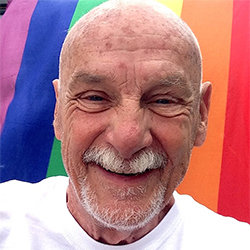
To diddle an old saying: You can't judge a gay author — or his book — by the cover.
Case in point: Groundbreaking 1951 sociological expose, "The Homosexual in America." Gay nom de plume: Donald Webster Cory. Real name: Edward Sagarin. Outed dramatically 24 closeted years later. (A gay Dr. Jekyll and Mr. Hide. er, Hyde.)
Cory's "Homosexual" followed three years after Alfred Kinsey's shelf-shocker, "Sexual Response in the Human Male." Both books provided in-your-face facts, focus, insights on a previously little discussed, statistically undocumented subject: homosexuality.
Kinsey, a biologist and authority on Gall Wasps, turned his scientific cataloging to humans. His research institute colleagues interviewed 5,940 men about their sex lives. The result: 804 pages of tables, charts, statistics. Dull; but, for the American public, titillating best-seller reading.
Data showed 37 percent of the male population had at least some overt gay experience to ejaculation; 4 percent of white males were exclusively homosexual after the onset of adolescence. Findings were startling, staggering and, from our perspective today, ultimately liberating.
It's safe to say of the time frame 69 years ago that the average Joe believed he had never met a homosexual; that fags, fairies, fruits were few, but even so: they were perverts, mentally unbalanced, to be incarcerated, punished if caught with their collective pants down, justifiably shunned by church, family, employers, military, government; to be dealt with by psychiatrists and/or police. (Sound just vaguely familiar?)
Those Americans living in large cities — Chicago, New York, San Francisco and Detroit — were likely to be aware of thriving gay subcultures gathered secretly in gay bars. (Detroit's bar community dates to Prohibition, with earlier house parties in the '20s. Gay bars thrived during World War II.)
Sagarin, a married bisexual, sociologist, trained criminologist (and curiously, perfume authority), documented gay life as a social phenomenon and as a participant observer in his "The Homosexual in America." He provided a fair-minded understanding of gay persons, their subculture, slang, sexual acts, their basic proximity to the so-called heterosexual "norm.
"As a minority homosexuals are caught in a particularly vicious circle," said Sagarin, writing as Donald Webster Cory, a pen name name gleaned from Andre Gide's 1924 gay novel "Corydon," later published in America in 1950.
"On the one hand, the shame of belonging and the social punishment of acknowledge are so great that pretense is almost universal. On the other hand, only a leadership that would acknowledge (being homosexual) would be able to break down the barriers of shame and a resultant discrimination.
"Until we are willing to speak out openly and frankly in defense of our activities, and to identify ourselves with the millions pursuing these activities, we are unlikely to find the attitudes of the world undergoing any significant change."
Nonetheless, for all his advocacy on the behalf of America's gay population, Sagarin very cautiously, quietly, and only in 1962, joined the homophile Mattachine Society. His participation was supportive but "don't rock the boat": no militant advocacy for civil rights.
As a sociologist, himself in psychotherapy, Sagarin believed that homosexuality was a pathology; that homosexuals should seek psychotherapy. Few of his gay friends or colleagues knew that he was the famous (at least in gay circles) Donald Webster Cory. His second gay book, is "21 Variations on a Theme."
His real identity remained secret until a 1974 American Sociological Society convention held in Montreal. He appeared on a panel, "Theoretical Perspectives on Homosexuality," speaking strongly against liberationist scholarship. A colleague, Laud Humphreys, took umbrage — and perhaps some polymorphous perverse delight — in exposing Sagarin by repeatedly calling him Mr. Cory.
Sagarin broke down in tears; withdrawing thereafter from all issues concerning homosexual discussion. He died in 1986, age 73. Dr.. Jekyll Hyde or not, he was a pioneer for humane understanding of gay people. (R.I.P.: Rest In Pride.)










